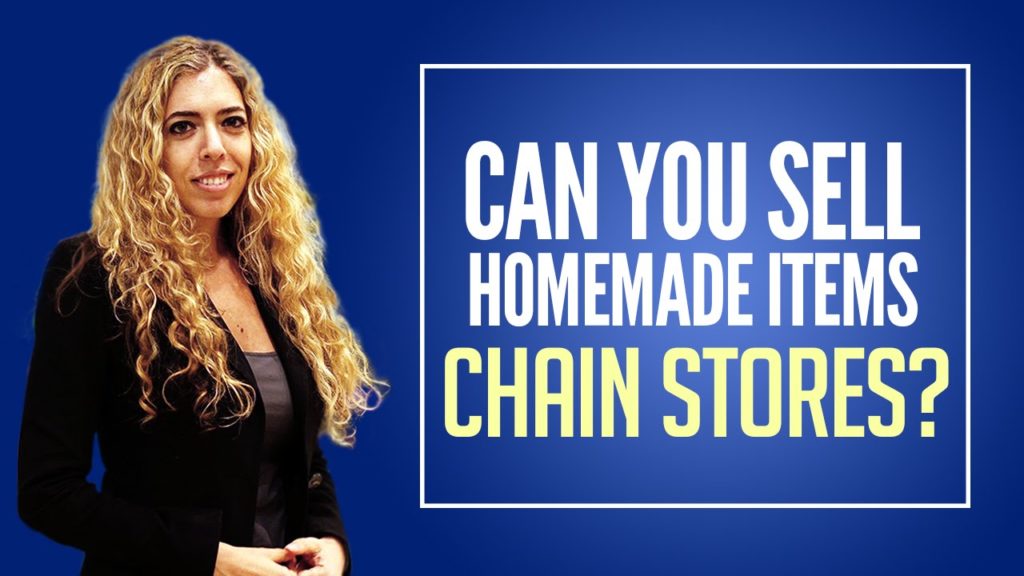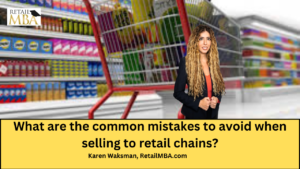Can You Sell Homemade Items to Chain Stores?
Wondering if you can sell your handmade products to retailers? Take a moment to watch this short training video to find out!
A common question I often receive is whether creators of handmade products can break into the retail chain store market. Many individuals find themselves wondering whether they need to manufacture their items, in countries like China or if its even feasible to collaborate with big name stores. In this video, I’ll discuss into these concerns. Offer insights about selling homemade items to chain store retailers.
Selling Handmade Products to Large Retailers
It’s important to note that large retailers, often referred to as big box stores face challenges when it comes to incorporating products into their operations due to the sheer scale of their business. For instance lets consider a store with 500 locations that decides to feature two pieces of a product per store. This would require a total of 1,000 pieces! As you can imagine this poses hurdles for creators who haven’t yet cracked the code on mass production.
However there are exceptions worth exploring. Some department stores and retailers are open minded and interested in showcasing captivating products such as jewelry or gift items. These establishments frequently offer programs designed specifically for highlighting artisans and their remarkable creations. They might be willing to stock your goods in stores providing an exceptional opportunity, for exposure and potential sales.
Demonstrating Capacity and Production Capability
If you’re looking to sell your products in retail stores it’s crucial to show the buyer that you’re fully equipped to meet their demands. This involves highlighting the presence of a team of creating your products and showcasing your efficient production process. It’s important to provide details, about your production capacity estimated order fulfillment timeframes and any other pertinent information.
By showcasing your ability to produce goods on a scale you can instill confidence in the buyer and increase the likelihood of having your handmade items stocked in their stores. It’s vital to communicate your production capabilities while addressing any concerns or questions the buyer may have.
Consider Diverse Retailers
When selling a product it’s worth exploring opportunities with retailers at levels. Not all retailers are chain stores with locations. There are retailers that operate a handful of stores as well as mid sized retailers with around 20 or 50 locations. These types of retailers may be more receptive, to collaborating with creators of products who can meet their quantity requirements.
Of focusing on big box stores it could be beneficial for you to consider engaging with smaller or mid sized retailers as well.Selling your products on a scale can be made easier by avoiding the challenges of dealing with a chain of a thousand stores. In my program Retail MBA I offer guidance on types of retailers and how to determine the most suitable ones, for your unique handmade products.
Selling Handmade Products to Stores
To sum up it is possible to sell handmade products to retailers, including large chain stores. While many big box stores may not typically accommodate items due to their size there are exceptions such as department stores and retailers that emphasize on captivating merchandise. By showcasing your production capacity and targeting tiers of retailers you can enhance your chances of having your handmade products stocked in stores. It is crucial to communicate your capabilities and take into account the requirements of each retailer. With the approach and strategy you can achieve sales of your handmade products on a larger scale.
I hope this video has provided insights into selling products in big box stores. If you’re interested in delving into strategies and finding the ideal retailers, for your products I encourage you to explore my program called Retail MBA.
It encompasses facets of sales and can assist you in navigating the process of selling your handmade items to larger retailers.
Keep in mind by preparing and comprehending the environment you can transform your handmade products into a prosperous business endeavor. Best of luck!

Transcript Outline for "How to Sell Handmade Items to Stores"
Selling Handmade Products: Unlocking Opportunities with Major Retailers
A common question I encounter is whether its’ possible to sell handmade products to larger retailers. Many artisans and creators ponder over the need to manufacture their products in China or to scale up production in order to meet the demands of big box stores. In this article my aim is to demystify this topic and provide valuable insights into the feasibility of selling handmade products to major retailers. While most big box retailers may struggle with accommodating handmade products due to volume constraints. There are exceptions and alternative approaches that can still open doors for artisans.
So lets delve into the possibilities and strategies for successfully selling handmade products to major retailers. Exploring Feasibility:
The primary challenge in selling handmade products to big box retailers lies in scalability. These retailers operate hundreds of stores. And even if they were willing to allocate just a few pieces per store.
The demand quickly skyrockets. For many artisans meeting such volume requirements without compromising the essence of their handcrafted products becomes an uphill battle. Nevertheless there are exceptions and alternative routes worth exploring.
Local Buying Programs:
Certain department stores and retailers offer local buying programs that enable them to source unique and locally crafted merchandise. These programs present opportunities for artisans to have their handmade products featured in a select number of stores. While this may not cover all retail locations.
It serves as an advantageous entry point for showcasing your creations and gaining exposure. Demonstrating Production Capacity:
Providing evidence of your ability to scale up production without compromising quality or uniqueness significantly increases your chances of consideration by major retailers. This involves highlighting your production team. Explaining your production process, capacity capabilities, and estimated lead times.
Buyers seek assurance that you can consistently fulfill their orders while meeting their business requirements.
Targeting Different Tiers of Retailers:
Consider widening your search beyond big box stores by exploring other tiers of retailers. To successfully sell your handmade products to major retailers it is important to have a well thought out strategy.
Here are some key considerations:
1. Research and Identify Target Retailers: Take the time to thoroughly research retailers that align with your product niche, values, and production capabilities.
Look for local buying programs, specialty stores, and mid sized retailers that may be more inclined to work with handmade products.
2.Showcase Your Unique Value: Highlight the special qualities, craftsmanship, and story behind your handmade products. Emphasize what makes your creations stand out from mass produced alternatives.
3. Develop a Production Plan: Create a clear production plan that outlines your capacity, lead times, and quality control processes.
This will give buyers the confidence that you can meet their demands and maintain the integrity of your handmade products.
4. Build Relationships: Network with assistant buyers and establish meaningful connections. Assistant buyers often become future buyers themselves so treating them with respect and professionalism can be beneficial in the long run. 5. Consider Trade Shows and Craft Fairs: Participating in trade shows and craft fairs can offer opportunities to showcase your handmade products directly to retailers and gain exposure. These events provide platforms for connecting with buyers who are specifically interested in unique and artisanal products.
In conclusion. While selling handmade products to major retailers may present challenges. It is possible with the right strategies and approach. By considering local buying programs demonstrating your production capacity targeting the appropriate tier of retailers emphasizing your unique value conducting thorough research, building relationships and maintaining persistence in your pursuit – you can position your handmade products for success. In my program, Retail MBA, I offer extensive guidance on selling to various types of retailers. I provide strategies that are specifically customized for selling handmade products. By dedicating yourself, leveraging creativity, and implementing the appropriate strategy, you can uncover opportunities and establish retail partnerships with individuals who genuinely appreciate and value your handmade creations.
.
Check Out Our Additional Blog Posts Here:

Retail Terms
Retail Terms – What are the payment terms typically offered by retail chains? Click Here to Learn More!

Retail Vendor
Retail Vendor – What are the common mistakes to avoid when selling to retail chains? Click Here to Learn More!

How to Sell Your Holiday Products to Retail Chains
New Training on How to Sell Your Holiday Products to Retail Chains

Why Buyers Don’t Want Your Product at Retail
Why Buyers Don’t Want Your Product

Ulta Beauty Vendor
Ulta Beauty Vendor – How to Sell to Ulta Beauty Stores. Click Here to Learn More!

Retail Strategy
Retail Strategy – How do I handle negotiations with retail chains? Click Here to Learn More!

Step-by-step training on how to sell to retail chains!
We explain exactly how to do that and how to get started today. I’ve taught over 100,000 of companies over the years across the globe on how to get your products to the stores. And so we’re here to support you. Or please subscribe to our Youtube channel and or be on the lookout for additional training that we create.
We are here to expedite the process of generating revenue with your physical products and that’s what we’re all about. Take a look at our advanced training, live events, certification programs and so much more.
In this training, I will discuss some of the things to think about when approaching a retailer to sell your products and become a vendor. Hope it helps! 🙂
Karen Waksman,
Retail MBA
Questions? Contact Us!
1-855-Retail-2 (Call or Text)
Email: info@retailmba.com
Retail MBA provides a step-by-step formula on How to Sell to Major Retailers, Online Retailers, Smaller Retailers, Catalogs and More. No Experience Required! These solutions continue to convert for clients year-over-year! These are Time-Tested and Proven Strategies that we utilize ourselves when going after stores! Everything we teach, we test. Want access to these formulas? ANY one of our programs and coaching systems gives you access to them now. With that said…
Here are 5 Easy Ways to Work with Us:
1) Free Training – If You Would Like to Join Our Next FREE Webinar Training Called “Retail Chain Store Secrets – How to Sell to Major Retail Chains. No Experience Required” Then Sign Up NOW To Learn All About Selling into Retail Chains By Clicking Here!
2) Retail MBA Year Long Coaching and Training System – Our Year Long Coaching and Training System with Karen Waksman is POWERFUL! This is our most popular training and coaching system! We walk you through how to approach, pitch and sell to retail chains and we coach you along the way! Join us by Clicking Here!
3) Masterclass Intensives – Want to Join our Next 4 Week Elite Retail MBA Masterclass Intensive? These Intensives Are EPIC for people who Love Fast Paced Learning – Homework, Retail Coaching, Developing Your Strategy, Buyers Contacts and More! These Events Are Held Every Quarter. Join us by Clicking Here!
4) Done-for-You Program – If You Want Karen Waksman and Her Team to Reach Out to Your Top Dream Retail Chains On Your Behalf – And You Have a Retail-Ready Product, Check Out our Epic Done-For-You Service by Clicking Here!
5) In Person Events – If You Want to Learn LIVE and Meet Karen Waksman in Person at Our Next “America’s Next Retail Product: LIVE Event with Other Like-Minded Individuals in Beautiful San Diego, CA! We Would LOVE to Have You Join Us by Clicking Here!
